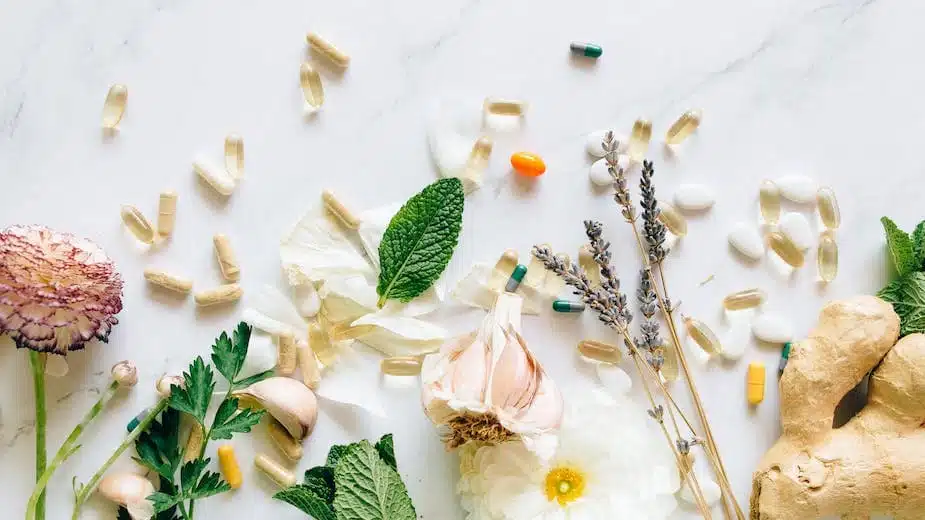Inflammation gets a bad rap, but this vital part of the immune response protects us from infection and speeds healing. Yet when inflammation persists unregulated, it causes chronic pain and paves the way for disease. Often NSAID medications like Advil that inhibit inflammation areRecommendeddespite significant side effects withlong-term use.
Fortunately, multiple natural anti-inflammatories derived from wholesome dietary sources safely calm inflammation sans harsh risks. Read on to discover how ingredients like tart cherry, turmeric, omega-3s and green tea can promote healing by naturally resolving the root cause of discomfort – inflammation.
Chronic Inflammation: At the Root of Pain and Malaise
Inflammation lies at the crux of most disease processes and chronic pain syndromes. This defensive phenomenon acts as a double-edged sword. Acute or short lived inflammation shields against foreign invaders and irritants when you skin your knee or come down with a cold. White blood cells swarm the scene to destroy pathogens, remove debris and lay groundwork for repairs.
Swelling, heat, redness and pain signify appropriate temporary inflammation handling tissue damage. Once threats pass, anti-inflammatory signals concluding the immune response prevent excessive inflammation from degrading healthy tissue. Healing progresses unhindered.
However in some cases, the inflammatory process persists abnormally long after threats depart. Ongoing disruption of cellular function damages organs and nerves, inciting systemic pain. Unchecked inflammation brews diseases like cancer, diabetes, Alzheimer’s, arthritis and heart disease.
Root causes like food sensitivities, leaky gut syndrome, recurring infections, obesity and chronic stress fuel runaway inflammation. Traditional medicine frequently overlooks underlying drivers to merely mute symptoms. By instead resolving what sustains inflammation naturally with diet and lifestyle tweaks, lasting relief comes without side effects.
The Pitfalls of Long-Term NSAID Reliance
Non-steroidal anti-inflammatory drugs (NSAIDs) like ibuprofen and naproxen efficiently disrupt inflammatory pathways, imparting analgesic and antipyretic effects. Short term NSAID use alleviates pain and fever associated with minor infections or injuries. However evidence increasingly indicts lengthy NSAID use in serious cardiovascular, gastrointestinal and renal adverse effects.
Frequent aspirin intake notoriously irritates stomach linings, causing ulcers and bleeding. Long-term NSAID use similarly heightens ulcer and hemorrhage risks, sometimes fatally especially amongst the elderly. Beyond GI troubles, ongoing NSAID reliance facilitates hypertension, edema and kidney disease. Heart attacks and strokes also correlate to chronic inhibitor drug use.
With NSAID side effects proving nearly as troublesome as pain itself, safer solutions exist. Nutritionally balancing diets to resolve what fuels inflammation and taking targeted natural anti-inflammatories sans harsh risks promotes lasting relief the right way.
Natural Anti-Inflammatories for Establishing Homeostasis
Certain dietary compounds exhibit innate abilities to beneficially modulate inflammatory pathways. By ingesting nourishing foods naturally rich in evidence-backed antioxidative and anti-inflammatory constituents, you can resolve systemic inflammation maintaining chronic pain.
Anti-inflammatory supplements like fish oil and turmeric also effectively rein in inflammation. When combined with balanced nutrition, stress reduction and microbiome support, natural anti-inflammatories holistically resolve root causes of runaway inflammation for good.
Tart Cherries Soothe Aches
Of anti-inflammatory foods studied, tart Montmorency cherries demonstrate exceptional potency taming inflammation. Beyond vitamins and minerals, these ruby red orbs contain anthocyanins granting antioxidant and anti-inflammatory powers.
Tart cherries proved similarly effective as NSAIDs reducing inflammatory osteoarthritis pain over 12 weeks. Fibromyalgia patients note less pain continuing tart cherry juice. Athletes likewise confirm accelerated workout recovery and curtailed muscle soreness from the fruit’s anti-inflammatory effects.
Exact mechanisms remain speculative but likely involve inhibiting COX inflammation pathways and lowering C-reactive protein and nitric oxide. For best results consuming whole tart cherries or unsweetened juice provides antioxidant, anti-inflammatory protection.
Turmeric Shines as Natural Anti-Inflammatory Star
The brilliant yellow spice turmeric boasts similar botanical lineage and chemical makeup as its relative ginger. Curcumin – the primary active compound in turmeric roots – emerges as a potent anti-inflammatory and antioxidant.
Traditional Indian Ayurvedic and Chinese medicine utilized turmeric treating everything from wounds to respiratory illness. Modern trials reinforce curcumin’s ability lowering inflammatory markers causing arthritis aches, joint damage, and loss of function. The compound further displays anticancer, antimicrobial and neuroprotective traits.
Curcumin blocks molecular inflammatory handlers like tumor necrosis factor alpha (TNF-α), interleukins, prostaglandin E2 and COX-2 production. Turmeric’s bioactive ingredients regulate over 700 genes, dampening enzymes propagating inflammation.
Though curcumin poorly absorbs eating turmeric alone, piperine in black pepper enhances bioavailability 2000%. For joint comfort and quelling chronic inflammatory conditions extract supplements boost effects.
Omega-3s Resolve Inflammation
Omega-3 fatty acids form vital structural components of cell membranes throughout the body. But the anti-inflammatory functions of omega-3s like EPA and DHA largely explain the correlating benefits of fatty fish consumption and fish oil to arthritis and chronic disease sufferers.
Since your body cannot generate significant omega-3s independently, regularly eating oily fish or taking supplements provides this essential inflammation-resolving nutrient. Beyond economizing COX and lipoxygenase inflammatory pathways, omega-3 liberates inflammation resolving compounds like resolvins lowering pain.
For optimal anti-inflammatory, antioxidant and triglyceride benefits consume 250mg combined EPA/DHA daily with food or get 2-3 weekly servings of salmon, mackerel or sardines. If cod liver or fish oil leaves you with fishy burps, switch to enteric coated pills. Those on blood thinners should exercise caution with fish oil due to bleeding risk.
Green Tea’s Antioxidant and Anti-Inflammatory Value
The Camellia sinensis plant brings us globally beloved green tea. Beyond hydrating fluid and slight caffeine stimulation, potent plant nutrients called polyphenols impart anti-inflammatory benefits with each cup. The most plentiful green tea antioxidant and anti-inflammatory polyphenols include:
- Epigallocatechin-3-gallate (EGCG)
- Epicatechin gallate (ECG)
- Epigallocatechin (EGC)
These potent constituents lower inflammatory markers C-reactive protein, TNF-α, interleukin-6 and quell NF-kappa B inflammation pathways. Population studies associate routine green tea consumption with reduced arthritis aches, improved cardiovascular parameters and decreased obesity.
Drinking just 2-3 cups of unsweetened green tea daily harnesses anti-inflammatory and antioxidant advantages. Pairing green tea with anti-inflammatory foods maximizes perks. Lemon brightens flavor sans adding inflammatory sugars.
DIY Anti-Inflammatory Infusions and Recipes
Combining natural anti-inflammatory ingredients allows you to concoct beverages with supersized inflammation-squashing abilities. Consider daily lemon ginger turmeric tea sweetened lightly with maple syrup or tart cherry juice mixed with green tea over ice.
For joint support salves, create skin soothing topical rubs with coconut or olive oil infused with arnica, turmeric, ginger and black pepper. Lavender, bergamot or peppermint oil provide further anti-inflammatory aroma-therapeutic benefits.
When cooking, generously season meat, grains and veggies with turmeric, rosemary, oregano, garlic, onions, shallots, ginger and lemon. Round out meals with side salads topped with anti-inflammatory fruits like berries, tart cherries, citrus and pineapple. Snack on walnuts, olives and homemade trail mix with almonds, pumpkin seeds and dried cherries or cranberries.
Tying It All Together: Embracing Natural Anti-Inflammatories Wellness
Inflammation cannot always be avoided. But many daily habits provoking continuous low grade inflammatory responses can and should get addressed as pivotal pillars of natural pain relief and prevention.
Clean anti-inflammatory eating, stress moderation practices, proper sleep, regular exercise, targeted supplementation plus microbiome support holistically resolve what drives out of control inflammation. Consult your integrative physician about advanced testing assessing contributing issues like food sensitivities, heavy metal toxicity and candida overgrowth.
Commit to dropping inflammatory influences like refined carbs and unhealthy oils from your diet and lifestyle. By embracing natural anti-inflammatories via both whole foods and targeted reinforcement with supplements, you beneficially impact total body burden and comfort without adverse effects. Feel the difference potent anti-inflammatory foods, herbs and nutrients make harnessing your body’s natural healing potential safely, successfully and deliciously!



